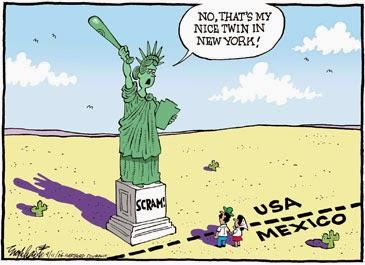 (Cartoon image above is by Bob Englehart in the Hartford Courant.)
(Cartoon image above is by Bob Englehart in the Hartford Courant.)Recently, there has been a lot of publicity about a few thousand Central American children who have come to this country and turned themselves in at the border. They were seeking asylum, because the violence in their own countries has put their lives in danger. The really sad part is that too many Americans simply don't care about these children (or whether they live or die). Polls show a majority want them deported (the quicker the better), and the federal government is doing that -- sending them back into danger and death.
But these children are not the only ones we are sending back into danger and death. A few thousand Central American women (many with small children) have also asked for asylum for their own safety. They are the victims of serious domestic physical abuse, and have been unable to get any help in their own country. The long and dangerous trek to the United States is their final effort to get some help.
Unfortunately for these women, the United States does not grant asylum to victims of domestic abuse -- even if sending them back obviously puts them in danger of being killed. And sending them back to their terrible and dangerous situation is exactly what the government has been doing. That seems to me to be a very hard-hearted policy for a nation where at least 98% of the population is either immigrants or the descendants of immigrants, and in direct opposition to the U.S. claim to be a nation supporting basic human rights. What human right is more basic than the right to live?
Fortunately for these women in dire peril, there is an immigration court that understands -- and thinks those in danger should be granted asylum. Last Tuesday, the Board of Immigration Appeals (BIA) made a landmark decision that could open the way for women whose lives are in danger from domestic abusers to receive asylum and stay in this country. Here is how that decision was described in Mother Jones magazine:
The case involved a Guatemalan woman who ran away from her abusive husband. "This abuse included weekly beatings," the court wrote in its summary of her circumstances. "He threw paint thinner on her, which burned her breast. He raped her." The police refused to intervene, and on Christmas 2005, she and her three children illegally entered the United States.
Before Tuesday's decision, immigration judges routinely denied asylum to domestic violence victims because US asylum law does not protect people who are persecuted on account of their gender. The law only shields people who are persecuted because they are members of a certain race, religion, nationality, political opinion, or particular social group. Tuesday's ruling, however, recognized "married women in Guatemala who are unable to leave their relationship" as a unique social group—giving the Guatemalan woman standing to make an asylum claim. . .
Tuesday's decision is a sharp departure from a 1999 ruling, in which the BIA found that Guatemalan women who cannot leave their marriages are not a protected class. That decision was vacated by then Attorney General Janet Reno. Rody Alvarado, the applicant in that case, won asylum in 2009, 14 years after making her plea. . .
The Guatemalan woman at the center of Tuesday's ruling, identified by the court only as A-R-C-G-, does not earn asylum as a result of the decision. Instead, the BIA sent her case back down to the immigration court level. Because there is a backlog of nearly 400,000 deportation cases pending before US immigration courts, a final decision could take years.
But the implications of the decision extend well beyond her case. The ruling will affect some 300 women who have appealed their domestic-violence asylum cases to the BIA. In almost all of those cases, according to Frydman, the applicant is a Central American woman who sought asylum after being apprehended near the US border. The women then went before an immigration judge who believed the facts of their cases, but ruled that they didn't belong to a protected group that could claim asylum.
It's about time this country decided that human lives are more important than ridiculous laws supported mainly by racist haters who have forgotten their own heritage. It's time we put xenophobia behind us and start living up to our claim of being a beacon for human rights in the world. We can't be a beacon with just big talk -- it requires action. And a good start would be to grant asylum to those whose lives are in danger (even if they happen to have brown skin).

